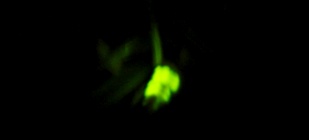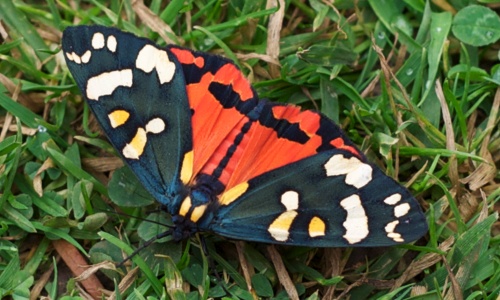I didn’t want my post on rails and crakes to suffer from poetry bloat, so I didn’t quote it before, but John Clare isn’t the only Dead Famous English Poet who mentioned corncrakes in a poem.
This is the mowing scene from Upon Appleton House, to My Lord Fairfax by Andrew Marvell. I went through modernising the spelling and capitalisation, because frankly I can’t see any advantage to keeping it old-school, so if I’ve missed anything, my apologies:
And now to the abyss I pass
Of that unfathomable grass,
Where men like grasshoppers appear,
But grasshoppers are giants there:
They, in their squeaking laugh, contemn
Us as we walk more low then them:
And, from the precipices tall
Of the green spires, to us do call.
To see men through this meadow dive,
We wonder how they rise alive.
As, under water, none does know
Whether he fall through it or go.
But, as the mariners that sound,
And show upon their lead the ground,
They bring up flowers so to be seen,
And prove they’ve at the bottom been.
No scene that turns with engines strange
Does oftener then these meadows change,
For when the sun the grass hath vexed,
The tawny mowers enter next;
Who seem like Israelites to be,
Walking on foot through a green sea.
To them the grassy deeps divide,
And crowd a lane to either side.
With whistling scythe, and elbow strong,
These massacre the grass along:
While one, unknowing, carves the rail,
Whose yet unfeathered quills her fail.
The edge all bloody from its breast
He draws, and does his stroke detest;
Fearing the flesh untimely mowed
To him a fate as black forebode.
But bloody Thestylis, that waits
To bring the mowing camp their cates,
Greedy as kites has trussed it up,
And forthwith means on it to sup:
When on another quick she lights,
And cries, “he called us Israelites;
But now, to make his saying true,
Rails rain for quails, for manna dew.”
Unhappy birds! what does it boot
To build below the grasses’ root;
When lowness is unsafe as height,
And chance overtakes what scapeth spite?
And now your orphan parents call
Sounds your untimely funeral.
Death-trumpets creak in such a note,
And ’tis the sourdine in their throat.
I think it calls for a couple of vocabulary notes. The ‘scene that turns with engines strange‘ is a reference to stage machinery in the theatre; ‘Thestylis’ is a poeticism for a female mower; ‘cates’ are delicacies, and ‘sourdine’ is some kind of musical instrument. The dictionary can’t decide whether it’s a miniature violin or a woodwind of some kind, but presumably it’s a reference to the distinctive sound made by the corncrake.
I think this passage is a fair illustration of what a magnificently odd poem Upon Appleton House really is. Especially since the genre—a poem about a country estate designed to flatter its powerful owner and his family—seems so doomed to the formulaic. Perhaps he felt that the more remarkable the poem, the more effective the flattery. Or perhaps he was just enjoying himself. Or showing off.
Not all of this conspicuous ingenuity is equally successful, but sometimes it’s remarkable; the image of men bringing up flowers to prove they’ve sounded the depths of the grass is a brilliant way of making a relatively obvious comparison vivid and memorable. And the bit where Thestylis breaks out of character by commenting on something he’s just said is so unexpected. I can’t decide whether I think it’s effective as a literary device, but it’s certainly surprising in a C17th poem.
It’s good to be reminded occasionally that ingenious, peculiar, unconventional, clever-clever poetry isn’t just the preserve of Modernism.

